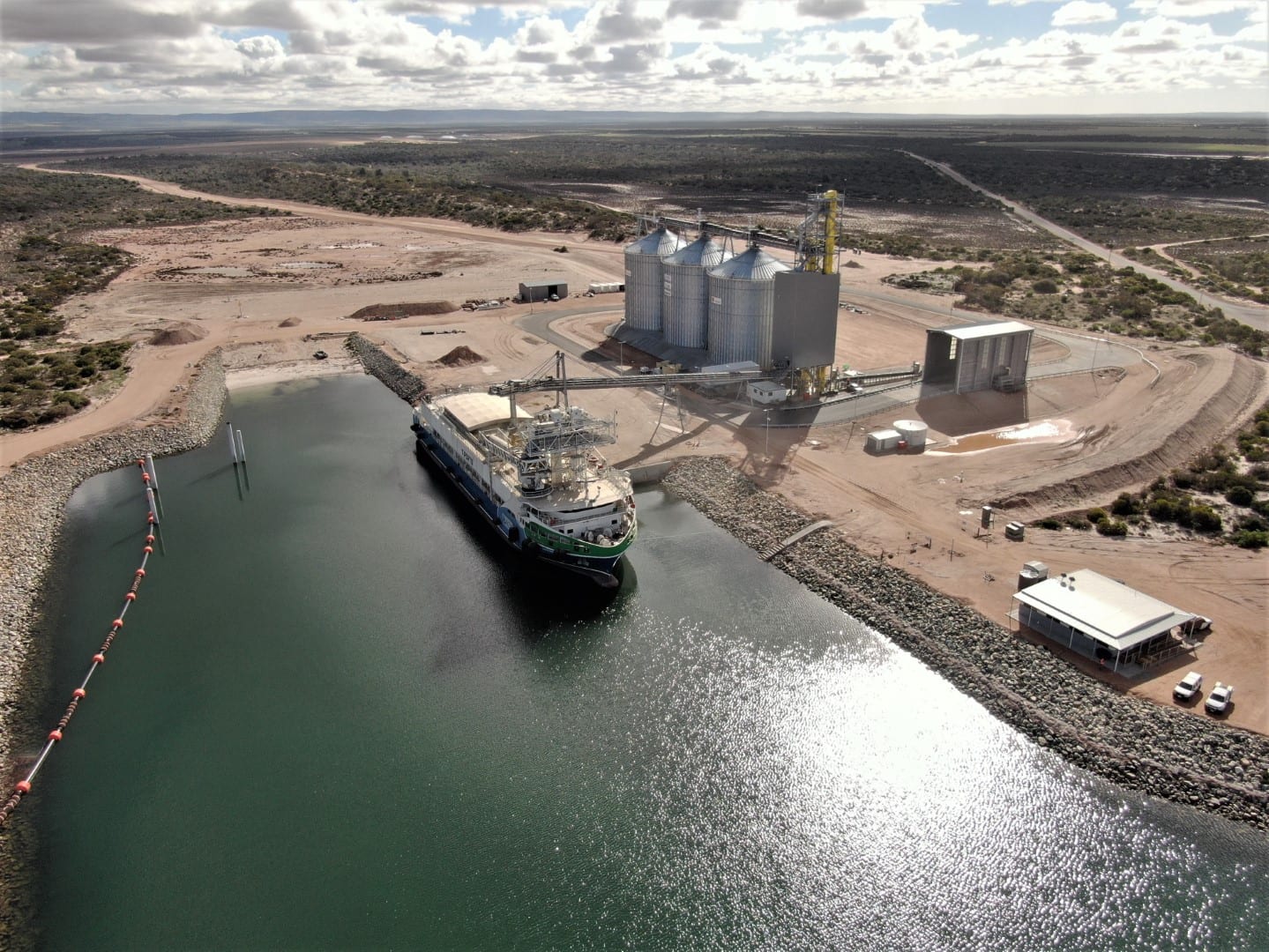T-PORTS LUCKY BAY CHANNEL EXTENSION PROJECT
About the Project
(Update March 2024)
To further enhance the operation of the facility, T-Ports has sought and received development approval to extend the channel from the Lucky Bay Common User Export Facility approximately 1400 metres into the Spencer Gulf (a 900 metre extension to existing 500 metre long channel). The extended channel will have a navigable depth of approximately 3.8 metres at lowest astronomical tide. The greater depth will allow each vessel to carry more grain, reducing the number of vessel movements and providing additional safety margin.
Following discussions with the Environment Protection Authority (EPA) and Coast Protection Board, T-Ports sought approval in 2023 to use two land-based locations identified to the west and north-west of the harbour for dewatering and disposal of dredge spoil.
T-Ports has varied the approval and EPA licence to enable the dredging to recommence in early April 2024, and proceed through to October 2024. The methodology will be the same as that utilised during the 2023 dredging campaign.
Updated documents and information in respect of the project is available on this page.
Project Benefits
Improved navigation to allow the safe passage of vessels into and out of Lucky Bay harbour.
Ongoing efficient operation of the Lucky Bay Common User Export Facility.
Reduced risk of impact on the marine environment by dewatering dredge spoil and disposing of material on-land.
Reduced operational impacts adjacent the Lucky Bay shack settlement.

Project Reports
A range of regulatory reports have been prepared to inform the operation and management of the project. T-Ports commits to the availability of a range of documents. This information will be updated and revised periodically.

Overall Site Plan

Channel Extension Plan

Dredge Spoil Site Arrangement

Community and Stakeholder Engagement Plan

Community and Stakeholder Engagement Plan
2024 Update
Latest News
Visit this page for project updates.
FAQ’s
Who will be responsible for the dredging works?
Maritime Constructions are authorised to undertake these works subject to conditions of an EPA licence and an approved Dredge Management Plan.
What is the cost of the project?
When will the works begin and finish?
How will the dredge be arranged?
A single dredge with a 3-anchor mooring will be positioned facing east out towards the approach channel with pipe running to the designated disposal site, progressively moving towards the outer extremity of the channel. Anchors stabilising the dredge will be placed 50 metres either side along the length of the dredge.
Will I be able to hear the dredging?
Typically noise from the dredge and associated machinery is low frequency consistent hum from diesel engines associated with either the dredge or booster pump. Louder activities such as anchor handling or tracking machines will be avoided at night.
There will also be additional noise from civil plant, required to manage (spread and compact) the discharge material.
Methods may be modified, if necessary, based on feedback received.
If you have concerns about noise during operations, you can log this with T-Ports on 1800 876 787 (menu 5) or email admin@tports.com.
Where will the materials dredged be taken?
Approximately 80,000 m3 of materials is to be dredged as part of this project. Materials dredged will be dewatered at two on-land sites adjacent the harbour before being transported for disposal inland at a former quarry site.
Material that is suitable for future beach nourishment will be separately stockpiled for this purpose.
Material that is not suitable for disposal at the former quarry site will be taken to a licensed landfill.
Is native vegetation at risk due to dredging works?
Native Vegetation Clearance for the seagrass in the extended channel has been granted approval by the Native Vegetation Council. A further application for clearance of vegetation on-land where the dewatering is now proposed to take place has been approved by the Native Vegetation Council.
T-Ports must offset any clearance by payment into the State Government Native Vegetation Fund, which is used to support revegetation programs around South Australia.
Why were the disposal methods chosen?
The subsequent approach to land based dewatering as disposal of dredge spoil was developed, approved and successfully implemented during the 2023 Dredging Campaign. The approach avoids the impacts of dewatering and direct disposal on the beach, but retains the ability for beneficial reuse of dredge spoil, including future beach nourishment.
Will there be an odour from the dredge materials?
The dewatering of the material on land will result in dredged material being handled a significantly greater distance from the shacks than previous maintenance dredging campaigns.
If you have concerns about odour during operations, you can log this with T-Ports on 1800 876 787 (menu 5) or email admin@tports.com.
Do I need to be concerned about air quality and dust from the works?
Air quality and dust management is low risk from this dredging activity. All dredge spoil is discharged wet as a slurry and civil plant will continually be working in wet areas.
If you have concerns regarding air quality and dust during operations, you can log this with T-Ports on 1800 876 787 (menu 5) or email admin@tports.com.
What is the impact on the marine environment due to dredging works?
The proposal should result in reduced risk of environmental harm to the areas of the marine park because the dewatering and disposal of dredge spoil is being undertaken at a land-based location.
A Seagrass Monitoring Plan has been prepared to manage seagrass impact. The Seagrass Management Plan has been implemented by surveys prior to, and following the 2023 Dredge Campaign, and a further survey to be undertaken prior to, and following the 2024 Dredge Campaign. Following completion of the project, further surveys will occur for at least five years from the date the project commenced.
The contractor is required to visually monitor the presence of marine mammals around the site and look for any unusual behaviour. Dolphins, turtles and whales are known to proactively enter proximity (<50 metres) of a working dredge and may take advantage of feeding opportunities. If any dolphins, turtles and whales are spotted within dangerous proximity, dredging will cease until they move away from the area.
All marine fauna sightings will be logged by the dredge operator, including behaviour and actions taken, if required.
Further Information
T-Ports is committed to engaging with the community and the fishing industry to accommodate and minimise impacts as much as possible during this important project.
If you have concerns or general comments regarding the project, or you would like a representative from the project team to contact you, please complete a Community Feedback Form.
